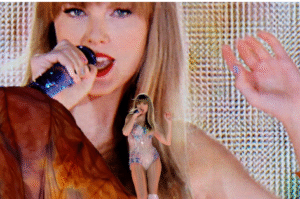
In the world of celebrity culture, scrutiny of personal lives is nothing new. But in recent days, pop superstar Taylor Swift has faced an unexpected wave of backlash from fans after discussions resurfaced online about the significant age gaps in two of her past relationships. What has shocked many supporters is not only the size of those gaps but the fact that she was in her twenties at the time — while the partners in question were still teenagers.
The revelation has sparked widespread debate about ethics, power dynamics, and double standards in the music industry, particularly when it comes to women in positions of power. While Swift has always been a lightning rod for cultural commentary, this particular controversy has stirred complicated emotions among her loyal fanbase — known as “Swifties” — many of whom now admit they feel conflicted, if not outright betrayed.
The Relationships in Question
Swift, now one of the most influential artists of her generation, is known for weaving her personal experiences into her songwriting. Many of her relationships have been publicly documented, sometimes in real time, sometimes retrospectively through her music. Among the long list of partners — ranging from fellow musicians to actors — two stand out for their timing.
In both instances, Swift was in her early twenties, already a global superstar, while her partners were still in their teens. Although neither relationship was hidden at the time, the cultural lens has shifted since then. With today’s heightened awareness about grooming, power imbalances, and the responsibilities of adults toward younger partners, fans are reevaluating the ethics of these romances.
What makes the issue especially sensitive is that the public image of Taylor Swift has long rested on a narrative of empowerment, vulnerability, and relatability. Many young fans grew up seeing her as a role model. Now, the idea that she may have participated in relationships that skirted uncomfortable boundaries leaves some questioning their devotion.
Fan Reactions: From Shock to Disgust
The controversy first gained traction on social media platforms such as X (formerly Twitter), TikTok, and Reddit, where fans began circulating timelines of Swift’s dating history. The posts highlighted how old she was at the time of the relationships compared to her partners’ ages, prompting users to express alarm.
One fan wrote: “I can’t believe I never realized the math before. We always talk about the men who dated Taylor when she was young, but nobody ever talked about when she was the older one. It feels hypocritical.”
Another user commented: “She was in her twenties. They were still teenagers. If the roles were reversed, people would be calling this predatory.”
The word “predatory” has indeed appeared frequently in online conversations. Though some argue it is too harsh a label given the legality of the relationships, others counter that legality is not the same as morality. As one Reddit thread pointed out, society has long condemned male celebrities for similar behavior, and consistency demands that women be held accountable as well.
The sense of betrayal among some fans is palpable. Swifties have long prided themselves on defending their idol against misogynistic double standards, but now some admit that their defense may have blinded them to legitimate critiques.
The Double Standard Debate
At the heart of the uproar lies a broader societal question: Do we apply different standards to male and female celebrities when it comes to age-gap relationships?
Historically, Hollywood has normalized older men dating much younger women, often portraying such pairings as glamorous rather than problematic. Figures like Leonardo DiCaprio have become infamous for dating women barely out of their teens, and yet — despite criticism — their careers remain largely unscathed.
Supporters of Swift argue that she is being unfairly singled out, while others insist that accountability should cut both ways. If fans criticize men for dating much younger women, then women who do the same should not be exempt.
One cultural commentator put it bluntly: “We can’t scream about power imbalances only when it’s convenient. The fact that Taylor Swift was a woman doesn’t erase the dynamic of a 20-something international superstar dating a teenager.”
Industry Context: The Pressures of Stardom
Some fans and analysts have also suggested that Swift’s position in the industry at the time may help explain — though not excuse — her choices. In her early twenties, Swift was navigating intense public scrutiny, career-defining transitions, and constant intrusion into her personal life.
Romantic relationships were not only personal but also deeply entwined with her artistic identity. Her music frequently chronicled her love life, which in turn fed a media narrative that often treated her as an object of curiosity and ridicule. Critics and tabloids framed her as a serial dater, while fans saw her as vulnerable, searching for connection amid chaos.
Within that environment, some argue, the boundaries of “normal” relationships became blurred. Yet others maintain that fame should not absolve anyone of responsibility — if anything, it should heighten awareness of ethical lines.
Reassessing the Legacy
The controversy is now raising uncomfortable questions about how Swift’s legacy will be remembered. For years, she has been celebrated as a feminist icon, someone who has fought against industry sexism and reclaimed her narrative. But does the revelation of her age-gap romances complicate that image?
For younger fans in particular, the issue is deeply personal. Many first connected with Swift’s music in their teens, relating to her portrayals of innocence, heartbreak, and self-discovery. To learn that she was simultaneously engaging in relationships with teenagers while she was already a grown adult feels like a rupture in that bond.
That said, not all fans are ready to cancel their idol. Some argue that people grow, mature, and make mistakes, and that Swift’s subsequent career has shown a commitment to empowerment, artistic integrity, and philanthropy. For these supporters, the past does not erase the present — but it does require acknowledgement.
What Comes Next
As of now, Taylor Swift has not issued any public statement addressing the renewed scrutiny. Her team has also remained silent. Given her history of addressing personal controversies through her music rather than press releases, some speculate that she may eventually weave this chapter into her art.
Whether or not she responds directly, the debate is unlikely to fade soon. The conversation ties into larger cultural reckonings about accountability, consent, and power dynamics, all of which are central to ongoing discussions around #MeToo and celebrity culture.
For fans, the controversy is a test of loyalty, values, and the complexities of idolizing real human beings with imperfect pasts. Some may choose to walk away, unable to reconcile their discomfort. Others may stay, hoping that recognition and growth can emerge from confrontation.
Conclusion
The uproar over Taylor Swift’s past age-gap relationships is more than just another celebrity scandal. It has become a mirror reflecting society’s evolving standards on ethics and relationships, as well as the double standards that still permeate public discourse.
For Swifties, it is a moment of reckoning — one that forces them to balance admiration for an artist with the need for honest accountability. Whether the controversy ultimately tarnishes Swift’s legacy or simply becomes another complicated chapter in her story remains to be seen. But one thing is clear: fans will no longer look at those early romances the same way again.


